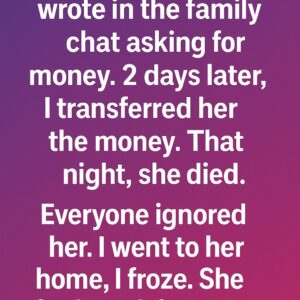I was racing home to my kids after another long, grinding day at the insurance office when I saw him—a man hunched against the cold, his dog curled protectively at his side. I bought them a hot meal and thought that was the end of it.
I had no idea that tiny decision would cost me my job… and completely change my life.
Most days at the office blur together: ringing phones, clients who treat you like a vending machine, and agents who argue loud enough to shake the blinds. I’m an administrative assistant in one of those small agencies nobody remembers by name. I refill the printer paper, schedule the meetings, fix the mistakes.
And I never stop watching the clock.
By five o’clock, my brain is already halfway home. My kids are five and seven—those magical ages where they can wrap their arms around your neck and make you feel like a superhero, then five minutes later send you into the bathroom just to breathe for a second.
Usually, our nanny picks them up. On days she can’t, my mother steps in. She’d worked a long shift at the hospital that day; I could hear the exhaustion in her voice when she called.
“Sweetie, is it okay if I give the kids some screen time? I’ll be right there with them. I just need a moment to relax.”
My mom has been my rock since my ex walked out two years ago—right after our youngest turned three. He just announced one day that he “wasn’t cut out for family life” and left with a suitcase and a shrug. My mother didn’t even hesitate. She just stepped forward and filled the vacuum he left behind.
So when she asks for “a moment to relax,” she gets it. No questions asked.
On my way home, I stopped at the grocery store to grab the essentials: mac and cheese, chicken tenders, apples, juice boxes—my single-mom version of a survival kit. The sky was already a heavy winter blue, the kind that makes the parking lot lights look too bright and everything feel colder than it really is.
I moved fast. The sooner I got home, the sooner my mom could go home and collapse into bed.
Arms full of bags, I stepped out into the biting wind. That’s when I noticed him.
He sat on the curb near the cart corral, coat too thin for the weather, shoulders hunched in that way people get when they’re trying to make themselves smaller. Next to him, a German Shepherd leaned against his leg, pressed so close it was almost like the dog was trying to hold him up.
The dog was clean and clearly cared for. The man… not so much.
As I passed, the dog watched me with calm, curious eyes. The man cleared his throat softly.
“Ma’am… I’m sorry to bother you.” His voice was rough from disuse, or maybe from life. “I’m a veteran. We haven’t eaten since yesterday. I’m not asking for money, just… if you have anything extra.”
Every warning I’ve ever been taught as a woman kicked in: dark, nearly empty parking lot, stranger, distance from the doors. Keep walking. Stay safe. Don’t stop.
But something in the way his hand rested on the dog’s back—steady, protective—made me pause.
“Hold on,” I said, before I could talk myself out of it.
I turned right back into the store, grabbed a hot dinner from the deli—chicken, potatoes, vegetables, something warm and heavy—and then picked up a big bag of dog food and a couple of bottles of water.
The cashier glanced at the items and gave a knowing little smile. “Cold night,” she said. “Good night to be kind.”
Outside again, I handed the bags to the man. He stared at them like he was afraid they’d disappear if he blinked.
“Ma’am…” His eyes filled, and he swallowed hard. “You have no idea what this means.”
“It’s okay,” I said softly. “Just take care of your buddy.”
The dog thumped his tail once, slow and grateful. The man thanked me until he ran out of words. I wished them well, got in my car, and drove home.
By the next week, the encounter had blurred into the background noise of my life: school pickups, lunches, laundry, renewing policies, fighting with copiers. It was just one small moment in a sea of obligations.
Until my boss called me into his office.
It happened about a month later. I was at my desk, frowning at a policy renewal that refused to process, when Mr. Henderson’s office door opened.
He’s in his early sixties with a permanent frown and the kind of posture that says he trusts no one and nothing—not the market, not the weather, not even the coffee machine. He walked toward my desk with his jaw clenched.
“Come here, Michelle,” he said sharply. “Now.”
My stomach dropped. “Is everything okay?”
“It’s about what you did a month ago,” he said, already turning back toward his office. “For that veteran with the dog.”
It felt like someone had poured ice water down my spine. How on earth did he know about that?
I followed him in. He shut the door, walked to his desk, and slid a thick cream-colored envelope toward me with two fingers, like it was something unpleasant.
“You need to see this.”
“What is it?” I asked.
“A letter,” he snapped. “From some veterans’ organization. Apparently, they think very highly of you.”
I opened it, confused. Inside was a formal letter on embossed stationery, praising my “compassionate and decisive intervention on behalf of a struggling veteran,” commending my character, and recommending that my employer “consider advancing Ms. Reyes to a position of greater responsibility and compensation.” At the bottom was a gold seal and several signatures.
“I don’t understand,” I said. “All I did was buy—”
“I know exactly what you did,” he growled, cutting me off. “You put this whole thing together to pressure me.”
“What?”
He started pacing. “Do you think I’m stupid? I’ve been running this office for forty years. I won’t be told what to do by some outside group sending fancy letters and ‘recommendations.’”
“I didn’t ask anyone to—”
“Enough.” He held up a hand. “You orchestrated this. Maybe you called them, maybe you begged them, I don’t know. But this is manipulation. And I will not tolerate it.”
Heat flooded my face. “Mr. Henderson, I swear, I didn’t—”
“Take it,” he snapped, pointing at the letter. “And take your things. You’re done here.”
My mind scrambled to catch up. “I’m… fired? Over this?”
“Yes,” he said, eyes cold. “Effective immediately. I won’t have an employee trying to control me from the shadows. Clear your desk.”
I stood there for a moment, stunned. Then the reality hit.
“I’m a single mom,” I whispered. “I have two kids. I need this job. Please—”
“Not my problem,” he said, already turning away. “Close the door behind you.”
I packed my things in a daze, trying not to cry in front of everyone, then walked out of that building feeling like someone had pulled the ground out from under me.
That night, after the kids finally fell asleep and my mother went home, I sat at the kitchen table with the letter in front of me. The gold seal caught the overhead light. It looked legitimate. Serious. Real.
I searched the organization’s name online. Pages of results popped up—programs, outreach, photos, testimonials. They were real. Which meant the letter was real too.
So why had they sent it?
The next morning, after dropping the kids at school, I called the number listed on their website. My hands shook as I dialed.
“Veterans Outreach Alliance, this is Stephanie,” a warm voice answered. “How can I help you?”
I said my name. There was a tiny pause.
“Oh,” she said. “Michelle. We’ve actually been hoping you’d call. Are you okay?”
That question almost broke me. I explained everything—what happened in the parking lot, the man and his dog, the letter, and finally the way my boss had fired me and accused me of setting him up.
By the time I finished, my voice was raw, and Stephanie sounded furious on my behalf.
“Can you come to our office tomorrow?” she asked. “We’d like to talk in person.”
The next day, I walked into a bright, busy office full of people who looked like they were there because they wanted to be, not because they were trapped. The receptionist greeted me with a smile that reached her eyes.
“We’re really glad you came,” she said.
They led me to a conference room. The director and two staff members joined us, all of them looking at me with a mix of gratitude and concern.
And then they told me what had happened on their end.
A few days after I’d met him, the man from the parking lot came into their office with his dog. He told them he’d been living on the street, feeling invisible and exhausted. He’d been too ashamed to ask for help.
Then, he said, a woman rushed out of a store, handed him hot food, dog food, water, and treated him like a human being instead of an inconvenience. That small act made him feel seen, and that feeling gave him enough courage to walk through their door and ask for help.
They got him medical care, emergency housing, counseling, job assistance. He was doing better now, getting back on his feet.
“He told us your name,” the director said, smiling gently. “He remembered your badge from work. He asked if we could thank you somehow. So we sent the letter.”
I swallowed hard. “I didn’t know.”
“We never imagined it would get you fired,” she added, her expression darkening. “When we learned what your boss did, we were… let’s just say ‘very unhappy.’”
They had already spoken to their legal team. They offered to represent me—free of charge.
“You did something kind,” the director said. “You shouldn’t pay for that with your livelihood.”
The legal process was draining and slow. There were letters, depositions, hearings. Mr. Henderson tried to argue that I’d conspired with the organization to pressure him. But the evidence told another story.
In the end, I was cleared. The termination was ruled wrongful. Mr. Henderson’s behavior and pattern of control came under scrutiny. He was removed.
I received compensation for lost wages and emotional distress. But money, surprisingly, wasn’t the most important outcome.
The organization offered me a job.
They needed someone to help coordinate services, manage schedules, answer calls, and talk to veterans who nervously dialed their number for the first time. In other words, they needed someone who knew how to run an office and had the heart to listen.
“You’ve already changed one life,” the director said. “We’d love to see what you could do if we gave you the space and the support to do that every day.”
The salary was better than what I’d made at the insurance office. The benefits were better too. But what made me say yes, without hesitating, was something else:
Meaning.
Now, I go to work knowing every answered call, every scheduled appointment, every form I file is connected to someone getting medical care, finding housing, reuniting with family, or simply eating a hot meal without wondering where the next one will come from.
I don’t count down the minutes anymore. Some days are hard, heartbreaking even. But they’re never empty.
I still think about that night in the grocery store parking lot. About the hungry man and his loyal dog. About how easy it would have been to look away, hurry to my car, and tell myself I was too busy, too tired, too scared.
Instead, I stopped. I bought dinner.
I lost my job… and found my purpose.
I used to think big changes came from big decisions. Now I know they can start from something as small as a hot meal in the cold, a kind word, and the courage to see someone who’s used to being invisible.
And if you’re ever wondering whether it’s worth it to help in some small way?
I’m living proof that yes, it is.
For them—and maybe, without knowing it, for you too.





